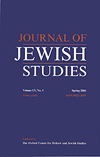
JOURNAL OF JEWISH STUDIES
Scope & Guideline
Illuminating Jewish History and Culture
Introduction
Aims and Scopes
- Jewish Historical Studies:
The journal publishes research that delves into the historical development of Jewish communities across different regions and epochs, exploring significant events, figures, and cultural practices. - Biblical and Rabbinic Literature:
A core focus is on the interpretation and analysis of biblical texts, Talmudic writings, and midrashic literature, including studies on exegesis and theological implications. - Interdisciplinary Approaches:
The journal encourages interdisciplinary research that connects Jewish studies with other fields such as theology, history, sociology, and linguistics, fostering a broader understanding of Jewish identity and experience. - Cultural and Social Dynamics:
Research on the social, cultural, and economic aspects of Jewish life, including the impact of diaspora experiences, memory, and identity formation, is a significant area of interest. - Jewish-Christian Relations:
The journal includes studies that examine the historical and theological interactions between Jewish and Christian communities, contributing to the understanding of religious dialogue and conflict. - Contemporary Jewish Thought:
Current discussions on Jewish philosophy, ethics, and theology are featured, reflecting modern challenges and interpretations within the Jewish intellectual tradition.
Trending and Emerging
- Digital Humanities in Jewish Studies:
An increasing number of publications are exploring the intersection of Jewish studies and digital humanities, utilizing computational tools for textual analysis and digital archiving of Jewish texts. - Memory Studies and Holocaust Representation:
There is a notable rise in research focusing on memory studies, particularly regarding Holocaust memory, representation, and the impact of digital media on collective memory. - Jewish Identities in Modern Contexts:
Emerging themes related to contemporary Jewish identities, including discussions on gender, ethnicity, and intersectionality, reflect a growing interest in how these identities are negotiated in modern society. - Cross-Cultural Interactions:
Studies examining the interactions between Jewish and non-Jewish cultures, particularly in the context of globalization and migration, are increasingly prevalent, highlighting the fluidity of cultural boundaries. - Environmental and Social Justice in Jewish Thought:
Research addressing environmental issues and social justice within Jewish ethical frameworks is gaining traction, demonstrating a commitment to contemporary global challenges through a Jewish lens.
Declining or Waning
- Medieval Jewish Mysticism:
There appears to be a decreasing emphasis on medieval Kabbalistic studies, as fewer recent publications explore mystical texts and their interpretations compared to previous years. - Traditional Jewish Law (Halakhah):
Research specifically centered on traditional halakhic discourse and its applications seems to be less frequent, possibly as scholars increasingly engage with modern interpretations and applications of Jewish law. - Historical Linguistics of Hebrew:
The focus on historical linguistics and the evolution of Hebrew as a language has diminished, with fewer studies dedicated to this aspect compared to earlier publications. - Jewish Art and Iconography:
Themes related to Jewish art and visual culture have seen a decline, indicating a potential shift away from visual studies in favor of textual and philosophical analyses. - Diaspora Experiences in Early History:
While still relevant, the specific focus on early diaspora experiences and their historical contexts has waned, possibly overshadowed by contemporary discussions on identity and memory.
Similar Journals
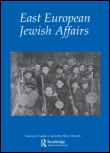
East European Jewish Affairs
Exploring the Rich Tapestry of East European Jewish HeritageEast European Jewish Affairs is a prominent scholarly journal published by Routledge Journals, Taylor & Francis Ltd, dedicated to exploring the intricate historical, cultural, and political dynamics of Jewish communities in Eastern Europe. With ISSN 1350-1674 and E-ISSN 1743-971X, this journal has been a critical platform for academic discourse since its inception in 1992, resuming publication after a hiatus in 2005. Although it is not an open-access journal, it provides vital insights into Jewish studies, engaging researchers, professionals, and students alike with in-depth analyses and discussions. The journal currently holds a Q4 ranking in multiple categories, including Cultural Studies, History, and Political Science and International Relations, reflecting its niche yet significant contribution to these fields. The 2023 Scopus rankings position it within the 34th percentile in History and the 10th percentile in Political Science, evidencing its specialized focus and the evolving nature of Jewish studies. For those investigating the unique social and cultural trajectories of East European Jewish communities, East European Jewish Affairs serves as an essential resource.
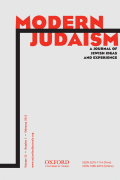
MODERN JUDAISM
Illuminating the Intersection of History and ModernityMODERN JUDAISM is a premier journal dedicated to the multifaceted exploration of Jewish culture, history, and religious practice, providing a significant platform for scholarly discourse since its inception in 1981. Published by Oxford University Press Inc in the United States, this journal stands out with its diverse engagement across disciplines, reflected in its commendable 2023 category quartiles: Q2 in Cultural Studies and History, Q1 in Religious Studies, and notable rankings in Political Science and Sociology. With an impact factor that underscores its rigorous peer-review process and scholarly relevance, MODERN JUDAISM serves as an essential resource for researchers, professionals, and students alike, fostering an academic environment conducive to innovative ideas and comprehensive studies. Although not open access, the journal remains crucial for anyone looking to deepen their understanding of contemporary Jewish thought and its intersection with broader cultural and political currents. For further inquiry or submissions, please refer to the Journals Department at 2001 Evans Rd, Cary, NC 27513.
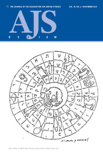
AJS Review-The Journal of the Association for Jewish Studies
Engaging with Critical Issues in Jewish StudiesAJS Review - The Journal of the Association for Jewish Studies is a leading academic journal published by the University of Pennsylvania Press, dedicated to advancing scholarship in Jewish studies. With its ISSN 0364-0094 and E-ISSN 1475-4541, the journal offers a rich compendium of research from various disciplines, including cultural studies, history, literature and literary theory, and religious studies. Recognized within the Q2 and Q3 quartiles across multiple categories in 2023, AJS Review provides an esteemed platform for academics to disseminate innovative ideas and engage with critical issues relevant to Jewish history and culture from 1976 to 2024. Although not an open-access journal, it ensures that high-quality, peer-reviewed articles are available to a global audience, enabling researchers, professionals, and students to foster deeper insights into Jewish narratives and heritage. By promoting interdisciplinary dialogue, AJS Review is integral to the academic community, offering valuable contributions to our understanding of Jewish studies and its broader implications.

JOURNAL OF JEWISH THOUGHT & PHILOSOPHY
Navigating the Rich Tapestry of Jewish Thought and CultureThe JOURNAL OF JEWISH THOUGHT & PHILOSOPHY, published by BRILL, stands as a significant academic resource since its inception in 1993. With the ISSN 1053-699X, this interdisciplinary journal uniquely bridges various fields including Literature and Literary Theory, Philosophy, and Religious Studies, providing a platform for rigorous exploration of Jewish intellectual traditions and their broader cultural implications. Holding esteemed rankings across multiple categories, including Q1 in Literature and Literary Theory and Q2 in Philosophy, the journal appeals to researchers and scholars worldwide. The journal is not open access but is available through numerous academic libraries, making it accessible to those dedicated to advancing knowledge in Jewish thought. By fostering critical discourse and innovative scholarship, it remains an essential resource for understanding complex intersections of faith, ethics, and society from a Jewish perspective.
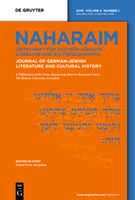
Naharaim
Exploring the Depths of Near Eastern ScholarshipNaharaim is a distinguished academic journal dedicated to fostering interdisciplinary scholarship in the field of Near Eastern studies. Published by Walter de Gruyter GmbH, this journal aims to provide a platform for innovative research that explores the rich historical, cultural, and social dynamics of the region. With an ISSN of 1862-9148 and an E-ISSN of 1862-9156, Naharaim adheres to high academic standards, although it does not currently offer open access options. The journal aspires to engage a global audience of researchers, professionals, and students eager to contribute to and gain insights from the evolving discourse surrounding Near Eastern cultures and histories. Through rigorous peer-reviewed articles, Naharaim plays a vital role in advancing knowledge and understanding in a field of study that is increasingly relevant in today’s interconnected world.

Arquivo Maaravi-Revista Digital de Estudos Judaicos da UFMG
Connecting Scholars in Jewish StudiesArquivo Maaravi-Revista Digital de Estudos Judaicos da UFMG is a distinguished open-access journal dedicated to the field of Jewish Studies, published by the Universidade Federal de Minas Gerais (UFMG). With an ISSN of 1982-3053, the journal has been serving the academic community since 2007, facilitating the dissemination of research and scholarship in Jewish cultural, historical, and religious studies. Situated in the vibrant academic landscape of Brazil, the journal aims to foster dialogue among researchers, professionals, and students, providing a platform for innovative and critical perspectives. Although the H-Index and specific Scopus ranks are not available, the journal's commitment to academic rigor and open access ensures that its content reaches a broad audience, empowering researchers and enriching the field of Jewish studies worldwide. The journal is based at FAC Ciências Econômicas, Av. Antonio Carlos, 6627, Belo Horizonte MG 31270-901, Brazil, making it an integral part of the UFMG's academic ecosystem.
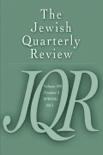
JEWISH QUARTERLY REVIEW
Charting New Territories in Jewish StudiesJewish Quarterly Review, published by University of Pennsylvania Press, is a distinguished academic journal that delves into the multifaceted realms of Jewish culture, history, and religious studies. With a rich publication history dating back to 1953 and an impressive track record of rigorous scholarship, this journal maintains a Q2 ranking in key categories such as Cultural Studies, History, and Religious Studies in 2023, placing it among the top-tier journals in its field. The ISSN number 0021-6682 and the E-ISSN 1553-0604 ensure that its scholarship is widely accessible and traceable in academic databases. While the journal is not open access, it remains an essential resource for researchers, professionals, and students seeking in-depth analysis and perspectives on Jewish thought and heritage. The JQR is known for its editorial commitment to enhancing understanding and dialogue across cultural and historical contexts, making it an invaluable asset for anyone engaged in Jewish studies and related disciplines. With its headquarters in Philadelphia, PA, the journal continues to foster scholarly engagement and critical discourse on Jewish identity and experience through its carefully curated articles and reviews.
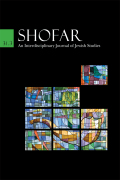
Shofar-An Interdisciplinary Journal of Jewish Studies
Unveiling the Rich Tapestry of Jewish ScholarshipShofar: An Interdisciplinary Journal of Jewish Studies, published by Purdue University Press, is a prominent peer-reviewed journal that engages with the diverse and rich tapestry of Jewish studies through interdisciplinary approaches. With a focus on cultural studies, history, and religious studies, the journal has established itself within the academic community, achieving significant recognition evidenced by its Q3 ranking in these disciplines as of 2023. Researchers and scholars in the field will find valuable insights and innovative discussions that push the boundaries of traditional scholarship. Though currently not open access, Shofar offers an enriching forum for scholarly discourse that fosters a deeper understanding of Jewish identity, history, and culture, making it an essential resource for professionals and students alike. The journal's ISSN is 0882-8539, while its E-ISSN is 1534-5165. It is operational from 2014 to 2024 and is located in the United States.

Judaica Bohemiae
Unveiling the Nuances of Jewish Existence in BohemiaJudaica Bohemiae, published by the Zidovske Muzeum Praze, is a prominent scholarly journal dedicated to the study of Jewish culture, history, and religious practices, with a particular focus on the Czech Republic and Central Europe. Since its relaunch in 2007, the journal has established itself as a valuable resource in the fields of Cultural Studies, History, and Religious Studies, achieving a commendable Q2 ranking across these disciplines in 2023. With its thoughtful compilation of research articles and critical essays, Judaica Bohemiae offers insights into the evolving dynamics of Jewish existence and identity. Although it does not currently operate under an open access model, the journal ensures that its high-quality content remains accessible to researchers, professionals, and students interested in the nuanced intersections of culture and history. By promoting rigorous academic discourse and advancing the understanding of Jewish heritage, Judaica Bohemiae continues to play a crucial role in its field, fostering scholarly connections and illuminating the past for future generations.

Tradition-A Journal of Orthodox Jewish Thought
Fostering Dialogue on Jewish Philosophy and EthicsTradition: A Journal of Orthodox Jewish Thought is a prestigious academic journal published by the Rabbinical Council of America, dedicated to the exploration and analysis of Orthodox Jewish thought and its implications on contemporary issues. With a legacy dating back to 1973, this journal serves as a crucial platform for scholars, theologians, and students interested in the rich tapestry of Jewish philosophy, law, and ethics. Although it does not offer open access, its thoughtful, peer-reviewed articles are essential for advancing knowledge in Jewish academia and fostering dialogue within the broader cultural context. As an authoritative voice in the field, Tradition invites submissions that challenge, inform, and inspire further inquiry into the complexities of Jewish tradition, ensuring that it remains at the forefront of scholarly discussion.